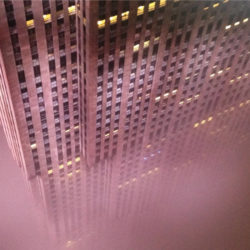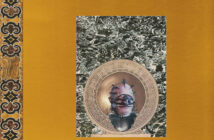A few years back, I got to review Danger Beach’s previous album, Pacific. At the time I was quite enamoured of Lachlan Thomas’ ability to work from a base in garage pop but expand into a range of other areas rather than be beholden to pastiche of the past. That album featured a range of collaborators upon whom Thomas could call to widen his own vision, while maintaining a consistency of creative, adventurous, lo-fi production.
With this new album, Contact, collaborators appear to be eschewed in favour of a narrower, more consistent timbral focus. Where the big surprise happens, though, is that guitars of any sort have been placed aside (apart, notably, from a small section in the album’s final 30 seconds), as have all acoustic drum and pretty much any electric or acoustic instruments. In fact, Contact bears little resemblance to much on Pacific at all. All sounds are synthetic, with either real or emulated classic analogue synths and drum machines being the order of the day. There is a strong link to 70s and early 80s modes of synthesised music, particularly artists working more in the production of sound environment rather than dance music – Tangerine Dream, John Carpenter or Jean-Michel Jarre being the most obvious touchstones. The bio terms Contact as an original soundtrack, but I’ve been unable to determine whether that means there’s an actual film for which the music has been composed or if ‘soundtrack’ here is used as a genre identifier.
Either way, the music clearly evokes a certain form, where synthetic music was able to be completely anachronistic to the content of a movie (I’m thinking especially of films like Chariots of Fire or Peter Weir’s Gallipoli), yet still be used to lay a successful emotional foundation for the ensuing action. There are therefore a number of layers of reference going on as the album plays out, all of which are circled by Thomas, and then subsequently circle the listener, very consciously.
I find it impossible to listen to the album without having thoughts of dappled, brightly lit early 20th century period films created in yet another period, the early-80s, as I listen. Almost a nostalgia for a certain form of nostalgia. But those feelings remain enigmatic, rather than specific. As with, say Tangerine Dream, I’m more than happy to listen and feel the idea of film evoked through music, without specific scenes, characters or plot progressions needing to come into play. If some music is allowed to evoke the feeling of being in nature, or being crowded by the urban environment, or catching late night post-rave buses, why can’t other music simply evoke the feeling of watching a certain type of film? That, in itself, feels a worthwhile pursuit to me.
Because, at its base level, this music is highly listenable. From the electro-percussion of ‘Interlude’ to the gloopy arpeggiated riffs of ‘Recluse’ or ‘Forever’, the eternal upward spirals of synth washes in ‘Coronation’ which always threaten to break into release but never do, or the creeping squeals, plinking electric piano and queasy low toned string yearnings in ‘Introduction (Ghost)’, everything is laid out in a stately manner, allowed to do its stuff, then move on. The mostly minor key melodies are engaging, while they also fall away enough to allow pulsing repetition to take hold at times.
If Contact doesn’t already have a film attached to it, it would be no stretch at all to see a film maker take its meanderings and add them seamlessly to one. Yet it doesn’t require one to work on its own terms. This music is evocative, but not fixed to specifics. The fact that it is also such a huge departure from anything in Thomas’ back catalogue is impressive and now places him in a position where he could do whatever he likes at all stylistically with future releases and it won’t sound like a betrayal of any core sound. And, surely, that’s the dream of any artist with a desire to remain creative for an extended period of time.
Adrian Elmer




